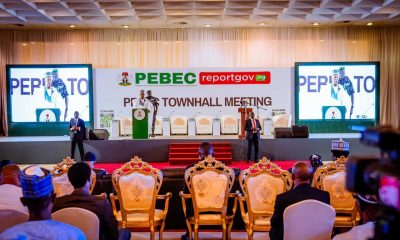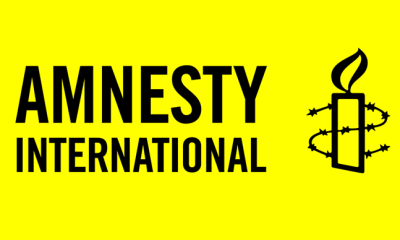Headlines
SERAP sues Tinubu over failure to probe missing oil revenues

SERAP sues Tinubu over failure to probe missing oil revenues
The Socio-Economic Rights and Accountability Project (SERAP) has filed a lawsuit against President Bola Tinubu over his administration’s failure to probe alleged missing funds for unaccounted oil revenues and repair of refineries between 2020 and 2021.
This is contained in a statement released by the organisation’s deputy director, Kolawole Oluwadare, and made available to newsmen on Sunday.
The allegations are contained in the 2021 report by the Nigeria Extractive Industries Transparency Initiative.
Oluwadare noted that the organisation, amongst other things, seeks the court order to compel Tinubu to “direct appropriate anti-corruption agencies to probe allegations of corruption involving the Nigerian Petroleum Development Company Limited, Nigerian Upstream Petroleum Regulatory Commission (NPDC) and State Owned Enterprises.”
In the suit number FHC/L/CS/2334/2023 filed last Friday at the Federal High Court in Lagos, SERAP is seeking “an order of mandamus to direct and compel President Tinubu to probe the allegations that US$15 billion of oil revenue, and N200 billion budgeted to repair and maintain the refineries in Nigeria are missing and unaccounted for.”
SERAP is also seeking “an order of mandamus to compel President Tinubu to direct appropriate anti-corruption agencies to probe allegations of corruption involving the Nigerian Petroleum Development Company Limited, Nigerian Upstream Petroleum Regulatory Commission (NPDC) and State Owned Enterprises (SOE).”
SERAP is also seeking “an order of mandamus to compel President Tinubu to use any recovered proceeds of corruption to enhance the well-being of Nigerians.”
SERAP argues that “many years of allegations of corruption and mismanagement in the spending of oil revenues and impunity of perpetrators have undermined public trust and confidence in governments at all levels.”
Read Also: SERAP sues Buhari over failure to probe missing ecological funds
In the suit, SERAP is arguing that “There is a legitimate public interest in ensuring justice and accountability for these serious allegations. Granting the reliefs sought would end the impunity of perpetrators and ensure justice for victims of corruption.”
SERAP also argues, “The allegations of corruption documented by NEITI undermine economic development of the country, trap the majority of Nigerians in poverty and deprive them of opportunities.”
According to SERAP, “Unless the President is directed and compelled to get to the bottom of these damning revelations, suspected perpetrators would continue to enjoy impunity for their crimes and enjoy the fruits of their crimes.”
SERAP also argues, “The findings by NEITI suggest a grave violation of the provisions of the Nigerian Constitution 1999 [as amended], national anticorruption laws, and the country’s obligations under the UN Convention against Corruption.”
The suit filed on behalf of SERAP by its lawyers, Kolawole Oluwadare, Andrew Nwankwo, and Ms Valentina Adegoke, read in part, “The Tinubu government has a constitutional duty to ensure transparency and accountability in the spending of the country’s oil wealth.”
“SERAP is seeking an order of mandamus to direct and compel President Tinubu to put in place mechanisms for accountability and transparency in the oil sector.”
“Section 13 of the Nigerian Constitution imposes clear responsibility on the government to conform to, observe and apply the provisions of Chapter 2 of the constitution. Section 15(5) imposes the responsibility on the government to ‘abolish all corrupt practices and abuse of power’ in the country.”
“Under Section 16(1) of the Constitution, the government has a responsibility to ‘secure the maximum welfare, freedom and happiness of every citizen on the basis of social justice and equality of status and opportunity.’”
“Section 16(2) further provides that, ‘the material resources of the nation are harnessed and distributed as best as possible to serve the common good.’”
“Similarly, articles 5 and 9 of the UN Convention against Corruption also impose legal obligations on the government to ensure proper management of public affairs and public funds, and to promote transparent administration of public affairs.”
“The UN Convention against Corruption and the African Union Convention on Preventing and Combating Corruption obligates the government to effectively prevent and investigate the plundering of the country’s wealth and natural resources and hold public officials and non-state actors to account for any violations.”
“Specifically, article 26 of the UN convention requires the government to ensure ‘effective, proportionate and dissuasive sanctions’ including criminal and non-criminal sanctions, in cases of grand corruption.”
“Article 26 complements the more general requirement of article 30, paragraph 1, that sanctions must take into account the gravity of the corruption allegations.”
“Nigeria is also a participating state of the Extractive Industries Transparency Initiative (EITI), which aims to foster greater governmental accountability for the use of natural resource wealth through the creation of a set of international norms on revenue transparency.”
“EITI also aims to tackle corruption, poverty, and conflict associated with natural resource wealth. Nigeria has the obligations to implement the EITI Standard, which sets out the transparency norms with which participating States including Nigeria must comply.”
“According to the 2021 report by NEITI, government agencies including the Nigerian Petroleum Development Company (NNPC) and the Nigerian Upstream Petroleum Regulatory Commission (NPDC) failed to remit $13.591 million and $8.251 billion to the public treasury.”
“The NNPC and NPDC failed to remit over 70% of these public funds. NEITI wants both the NNPC and NPDC to be investigated, and for the missing public funds to be fully recovered.”
“The report also shows that in 2021, the State Owned Enterprises (SOE) and its subsidiaries (the NNPC Group) reportedly spent US$ 6.931 billion on behalf of the Federal Government but without appropriation by the National Assembly. The money may be missing.”
“The NNPC also reportedly obtained a loan of $3 billion in 2012 purportedly to settle subsidy payments due to petroleum product marketers but there is no disclosure of the details of the loan, subsidy, and the beneficiaries of the payments.”
“The report also shows that N9.73 billion was paid to the NNPC as pipeline transportation revenue earned from Joint Venture operations but the money was neither remitted to the Federation nor properly accounted for. The NPDC in 2021 also failed to remit $7.61 million realized from the sale of crude oil.”
“The report documents that about N200 billion was spent on ‘refineries rehabilitation’ between 2020 and 2021 but ‘none of the refineries was operational in 2021 despite the spending.’ NEITI wants the spending to be investigated, as the money may be missing.”
Joined in the suit as Respondent is Mr. Lateef Fagbemi, SAN, the Attorney General of the Federation and Minister of Justice.
No date has been fixed for the hearing of the suit.
Headlines
Noble Ladies Champion Women’s Financial Independence at Grand Inauguration in Abuja

Women from diverse backgrounds across Nigeria and beyond gathered at the Art and Culture Auditorium, Abuja, for the inauguration and convention of the Noble Ladies Association. The event, led by the association’s Founder and “visionary and polished Queen Mother,” Mrs. Margaret Chigozie Mkpuma, was a colourful display of feminine elegance, empowerment, and ambition.
The highly anticipated gathering, attended by over 700 members and counting, reflected the association’s mission to help women realise their potential while shifting mindsets away from dependency and over-glamorization of the ‘white collar job.’ According to the group, progress can be better achieved through innovation and creativity. “When a woman is able to earn and blossom on her own she has no reason to look at herself as a second fiddle,” the association stated.
One of the association’s standout initiatives is its women-only investment platform, which currently offers a minimum entry of ₦100,000 with a return of ₦130,000 over 30 days—an interest rate of 30 percent. Some members invest as much as ₦1 million, enjoying the same return rate. Mrs. Mkpuma explained that the scheme focuses on women because “women bear the greater brunt of poverty” and the platform seeks “to offer equity in the absence of economic equality.”
Education is also central to the Noble Ladies’ mission, regardless of age. Their mantra, “start again from where you stopped,” encourages women to return to school or upgrade their skills at any stage in life. The association believes that financial stability is vital in protecting women from cultural practices that dispossess widows of their late husbands’ assets, while also enabling them to raise morally and socially grounded families.
Founded on the vision of enhancing women’s skills and achieving financial stability, the association rests on a value system that discourages pity and promotes purpose. “You have a purpose and you build on that purpose to achieve great potentials and emancipation,” Mrs. Mkpuma said.
A criminologist by training and entrepreneur by practice, she cautions against idleness while waiting for formal employment. “There are billions in the informal and non-formal sectors waiting to be made,” she said, rejecting the “new normal of begging” and urging people to “be more introspective to find their purpose in life and hold on to it.”
Mrs. Mkpuma’s management style keeps members actively engaged, focusing on vocational skills and training to prepare them for competitive markets. She is exploring “innovative integration of uncommon technologies” and is already in talks with international franchises to invest in Nigeria, with Noble Ladies as first beneficiaries.
The association’s core values include mutual respect, innovation, forward-thinking, equal opportunity, and financial emancipation. With plans underway to establish a secretariat in the heart of Abuja, the group aims to expand its impact.
The event drew high-profile guests, including former Inspector General of Police, Mike Okiro, and a host of VIPs, marking a significant milestone in the association’s drive for women’s empowerment.
Headlines
NEPZA, FCT agree to create world-class FTZ environment

The Nigeria Export Processing Zones Authority (NEPZA) has stepped in to resolve the dispute between the Federal Capital Territory Administration and the Abuja Technology Village (ATV), a licensed Free Trade Zone, over the potential revocation of the zone’s land title.
Dr. Olufemi Ogunyemi, the Managing Director of NEPZA, urged ATV operators and investors to withdraw the lawsuit filed against the FCT administration immediately to facilitate a roundtable negotiation.
Dr. Ogunyemi delivered the charge during a courtesy visit to the Minister of the Federal Capital Territory, Barrister Nyesom Wike, on Thursday in Abuja.
You will recall that the ATV operators responded to the revocation notice issued by the FCT administration with a lawsuit.
Dr. Ogunyemi stated that the continued support for the growth of the Free Trade Zones Scheme would benefit the nation’s economy and the FCT’s development, emphasizing that the FCT administration recognized the scheme’s potential to accelerate industrialisation.
Dr. Ogunyemi, also the Chief Executive Officer of NEPZA, expressed his delight at the steps taken by the FCT minister to expand the economic frontier of the FCT through the proposed Abuja City Walk (ACW) project.
Dr. Ogunyemi further explained that the Authority was preparing to assess all the 63 licensed Free Trade Zones across the country with the view to vetting their functionality and contributions to the nation’s Foreign Direct Investment and export drives.
“I have come to discuss with His Excellency, the Minister of the Federal Capital Territory on the importance of supporting the ATV to succeed while also promoting the development of the Abuja City Walk project. We must work together to achieve this for the good of our nation,” he said.
On his part, the FCT Minister reiterated his unflinching determination to work towards President Bola Ahmed Tinubu’s Renewed Hope Agenda by bringing FDI to the FCT.
“We must fulfil Mr. President’s promises regarding industrialization, trade, and investment. In this context, the FCT will collaborate with NEPZA to review the future of ATV, a zone that was sponsored and supported by the FCT administration,” Wike said.
Barrister Wike also said that efforts were underway to fast-track the industrialisation process of the territory with the construction of the Abuja City Walk.
The minister further said the Abuja City Walk project was planned to cover over 200 hectares in the Abuja Technology Village corridor along Airport Road.
According to him, the business ecosystem aimed to create a lively, mixed-use urban center with residential, commercial, retail, hospitality, medical, and institutional facilities.
He added that the ACW would turn out to be a high-definition and world-class project that would give this administration’s Renewed Hope Agenda true meaning in the North-Central Region of the country.
Barrister Wike also indicated his continued pursuit of land and property owners who failed to fulfil their obligations to the FCT in his determination to develop the territory.
Headlines
Benue IDPs block highway, demand return to ancestral homes

Vehicular movement along the Yelwata axis of the Benue–Nasarawa highway was brought to a standstill on Wednesday as Internally Displaced Persons, IDPs, staged a protest, demanding immediate return to their ancestral homes.
The protesters, believed to be victims of persistent attacks by suspected herdsmen, blocked both lanes of the busy highway for several hours, chanting “We want to go back home”.
The protest caused disruption, leaving hundreds of motorists and passengers stranded.
Eyewitnesses said the displaced persons, many of whom have spent years in overcrowded IDP camps, are expressing deep frustration over the government’s delay in restoring security to their communities.
“We have suffered enough. We want to return to our homes and farms,” one of the protesters told reporters at the scene.
Security personnel were reportedly deployed to monitor the situation and prevent any escalation, though tensions remained high as of press time.
Efforts to reach the Benue State Emergency Management Agency, SEMA, and other relevant authorities for comment were unsuccessful.
-

 Headlines4 years ago
Headlines4 years agoFacebook, Instagram Temporarily Allow Posts on Ukraine War Calling for Violence Against Invading Russians or Putin’s Death
-

 Headlines4 years ago
Headlines4 years agoNigeria, Other West African Countries Facing Worst Food Crisis in 10 Years, Aid Groups Say
-

 Foreign4 years ago
Foreign4 years agoNew York Consulate installs machines for 10-year passport
-

 News1 year ago
News1 year agoZero Trust Architecture in a Remote World: Securing the New Normal
-

 Entertainment3 years ago
Entertainment3 years agoPhyna emerges winner of Big Brother Naija Season 7
-

 Headlines1 year ago
Headlines1 year agoNigeria Customs modernisation project to check extortion of traders
-

 Entertainment2 years ago
Entertainment2 years agoMovie download platform, Netnaija, announces closure
-

 Economy2 years ago
Economy2 years agoWe generated N30.2 bn revenue in three months – Kano NCS Comptroller

















